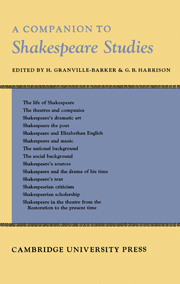Book contents
- Frontmatter
- Contents
- ILLUSTRATIONS
- Preface
- The Life of Shakespeare
- The Theatres and Companies
- Shakespeare's Dramatic Art
- Shakespeare the Poet
- Shakespeare and Elizabethan English
- Shakespeare and Music
- The National Background
- The Social Background
- Shakespeare's Sources
- Shakespeare and the Drama of his Time
- Shakespeare's Text
- Shakespearian Criticism
- Shakespearian Scholarship
- Shakespeare in the Theatre from the Restoration to the Present Time
- Reading List
- Appendices
- Index
- Plate section
Shakespearian Criticism
Published online by Cambridge University Press: 05 August 2012
- Frontmatter
- Contents
- ILLUSTRATIONS
- Preface
- The Life of Shakespeare
- The Theatres and Companies
- Shakespeare's Dramatic Art
- Shakespeare the Poet
- Shakespeare and Elizabethan English
- Shakespeare and Music
- The National Background
- The Social Background
- Shakespeare's Sources
- Shakespeare and the Drama of his Time
- Shakespeare's Text
- Shakespearian Criticism
- Shakespearian Scholarship
- Shakespeare in the Theatre from the Restoration to the Present Time
- Reading List
- Appendices
- Index
- Plate section
Summary
FROM DRYDEN TO COLERIDGE
I do not propose in this brief sketch to offer a compendium of all that has been written about Shakespeare in three languages in the period I have to cover. For that the reader may turn to Mr Augustus Ralli's History of Shakespearean Criticism (Oxford: 2 volumes). The purpose of a contribution on ‘Shakespeare Criticism’ to such a volume as this, as it seems to me, should be to provide a plan, or pattern, for the reading of the principal texts of Shakespeare criticism. Such a vast amount there is, such a sum of Shakespeare criticism increasing every day at compound interest, that the student of Shakespeare may well wonder whether he should consume his time over Shakespeare criticism at all. The first step, therefore, in offering a scheme of Shakespeare criticism is to give a reason why the student of Shakespeare should read what has been written about him. The second step is to make points of emphasis to show why he should read certain things first, and other things second; rather than occupy himself industriously reading everything that has been written about Shakespeare with equal attention and in perfect chronological order.
Why then, to begin with, should we read all that has been written about Shakespeare, in three hundred years, merely because we want to understand Shakespeare? Should we not rather just soak ourselves in the poetry and drama of Shake speare, and produce our own opinions, unaided and unencumbered by antiquity, about Shakespeare?
- Type
- Chapter
- Information
- Companion to Shakespeare Studies , pp. 287 - 304Publisher: Cambridge University PressPrint publication year: 1934

